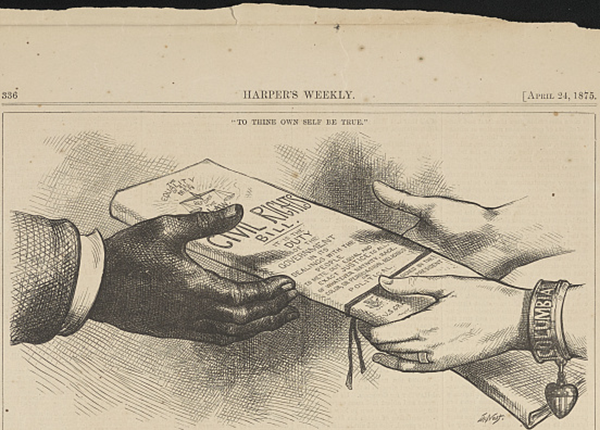Historic Document
Civil Rights Act of 1875, “An Act to Protect All Citizens in Their Civil and Legal Rights”
Congress | March 1, 1875

Library of Congress, Prints and Photographs Division
Summary
As early as 1870, Republican Senator Charles Sumner sought to protect African Americans from discrimination in public conveyances. He believed a civil rights act protecting access to public accommodation would be the permanent legacy of Reconstruction. Although Sumner did not live to see his bill passed, the Civil Rights Act of 1875, passed by the lame duck session of the House, became the first federal public accommodation law passed in the United States. By “public accommodation,” the bill specified “inns, public conveyances on land or water, theaters, and other places of public amusement,” although not businesses or, as Sumner conceded during debate over the bill, “social life.” Sadly, the Act was struck down in The Civil Rights Cases (1883) by a Supreme Court increasingly hostile to Reconstruction and African American civil rights. But the principle of protecting rights to public accommodation through federal legislation would be revived nearly a hundred years later, in the Civil Rights Act of 1964.
Selected by

Allen C. Guelzo
Director, Initiative on Politics and Statesmanship, James Madison Program in American Ideals and Institutions, Princeton University

Darrell A.H. Miller
Melvin G. Shimm Professor of Law at Duke University School of Law
Document Excerpt
Whereas, it is essential to just government we recognize the equality of all men before the law, and hold that it is the duty of government in its dealings with the people to mete out equal and exact justice to all, of whatever nativity, race, color, or persuasion, religious or political; and it being the appropriate object of legislation to enact great fundamental principles into law: Therefore, Be it enacted…That all persons within the jurisdiction of the United States shall be entitled to the full and equal enjoyment of the accommodations, advantages, facilities, and privileges of inns, public conveyances on land or water, theaters, and other places of public amusement; subject only to the conditions and limitations established by law, and applicable alike to citizens of every race and color, regardless of any previous condition of servitude.
SEC. 2. That any person who shall violate the foregoing section by denying to any citizen, except for reasons by law applicable to citizens of every race and color, and regardless of any previous condition of servitude, the full enjoyment of any of the accommodations, advantages, facilities, or privileges in said section enumerated, or by aiding or inciting such denial, shall, for every such offense, forfeit and pay the sum of five hundred dollars to the person aggrieved thereby, to be recovered in an action of debt, with full costs; and shall also, for every such offense, be deemed guilty of a misdemeanor….
SEC. 4. That no citizen possessing all other qualifications which are or may be prescribed by law shall be disqualified for service as grand or petit juror in any court of the United States, or of any State, on account of race, color, or previous condition of servitude; and any officer or other person charged with any duty in the selection or summoning of jurors who shall exclude or fail to summon any citizen for the cause aforesaid shall, on conviction thereof, be deemed guilty of a misdemeanor….




